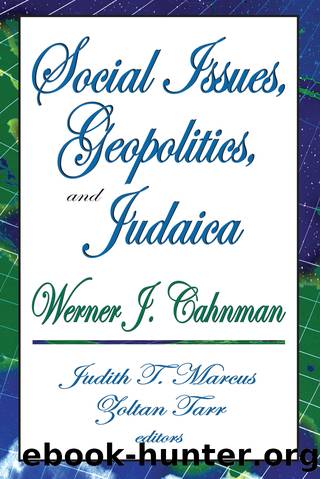Social Issues, Geopolitics, and Judaica by Werner J. Cahnman

Author:Werner J. Cahnman [Cahnman, Werner J.]
Language: eng
Format: epub
Tags: Social Science, Sociology, General
ISBN: 9781412809818
Google: U_4v94t3X0sC
Barnesnoble:
Goodreads: 16474881
Publisher: Taylor & Francis
Published: 2007-08-30T00:00:00+00:00
IV
Precisely what we indicated concerning the theory of the region in terms of Landschaft can be said about the region in terms of Raum. To be sure, region in terms of Raum presents a wider aspect than region in terms of Landschaft. A Raum may contain a variety of landscapes in the way of interrelated subregional units. Furthermore, Raum includes a political in addition to a social and cultural connotation, and as such has been elaborated by Ratzel in his volume on political geography,12 which, unfortunately has remained untranslated. Geopolitics, in particular, regards the spatial aspect of states only as a point of departure; it has been defined as a total and realistic, as over against a departmentalized and legalistic, political science which is to comprise all the social sciences in their political aspects. It is in this sense that Karl Haushofer has called Geopolitics repeatedly âa combination of geography and history,â as he does for instance on the title page of his highly stimulating if somewhat erratic, book on Die Geopolitik des Pazifischen Ozeans.13 The Pacific Raum, about which Haushofer wrote so often, denotes not only a geographical area stretching from the Straits of Singapore to the Isthmus of Panama, but also a unified battlefield of races, cultures, and political forces. Concepts such as Mittelmeerraum and Donauraum are even more to the point because their very formation and continued existence depends on the unifying influence which Roman and Habsburg rule exerted upon the area. Quite in contrast then to geographic determinism which posits that climate, soil, mountains, rivers, and coastlines direct and determine the course of social events, it is a powerful trend of thought in our time which is not interested in the hen-and-egg question of whether or not geography is the cause of history and vice versa but considers both in their functional interrelationship. Space frames action, but Raum, in turn, is a creation of social forces if and when they attain political organization. Forces, however, express themselves in movements and as such are comprehensible only in time.
Accordingly, the concept of Raum cannot always be translated to space or area. The normal three-dimensional space is made to appear as a combination of time and space, which would seem to correspond to the four-dimensional time-space conception of relativistic physics.14 As a matter of fact, the transformation of physical into political concepts has actually taken place, as for instance in Herman Lautensachâs paper on âThe Mediterraneans as Geopolitical Fields of Force,â15 or in Karl Springenschmidâs pamphlet on âThe Danube Region,â which bears the sub-title, âAustria within the Field of Force of the Great Powers.â16 These authors regard space as a frame or field wherein the forces of history, characterized by pressure plus direction and therefore comprehensible in analogy to vectors, can be observed in action. Hence, the geopolitical environment should not be understood in terms of a cause-and-effect philosophy but functionally, as part of one interdependent field, the life-space, the other part of which is constituted of the organized groups of history.
Download
This site does not store any files on its server. We only index and link to content provided by other sites. Please contact the content providers to delete copyright contents if any and email us, we'll remove relevant links or contents immediately.
| Anthropology | Archaeology |
| Philosophy | Politics & Government |
| Social Sciences | Sociology |
| Women's Studies |
Cecilia; Or, Memoirs of an Heiress — Volume 1 by Fanny Burney(32536)
Cecilia; Or, Memoirs of an Heiress — Volume 2 by Fanny Burney(31933)
Cecilia; Or, Memoirs of an Heiress — Volume 3 by Fanny Burney(31925)
The Great Music City by Andrea Baker(31908)
We're Going to Need More Wine by Gabrielle Union(19028)
All the Missing Girls by Megan Miranda(15916)
Pimp by Iceberg Slim(14476)
Bombshells: Glamour Girls of a Lifetime by Sullivan Steve(14046)
For the Love of Europe by Rick Steves(13846)
Talking to Strangers by Malcolm Gladwell(13339)
Norse Mythology by Gaiman Neil(13331)
Fifty Shades Freed by E L James(13227)
Mindhunter: Inside the FBI's Elite Serial Crime Unit by John E. Douglas & Mark Olshaker(9310)
Crazy Rich Asians by Kevin Kwan(9271)
The Lost Art of Listening by Michael P. Nichols(7485)
Enlightenment Now: The Case for Reason, Science, Humanism, and Progress by Steven Pinker(7303)
The Four Agreements by Don Miguel Ruiz(6735)
Bad Blood by John Carreyrou(6608)
Weapons of Math Destruction by Cathy O'Neil(6258)
